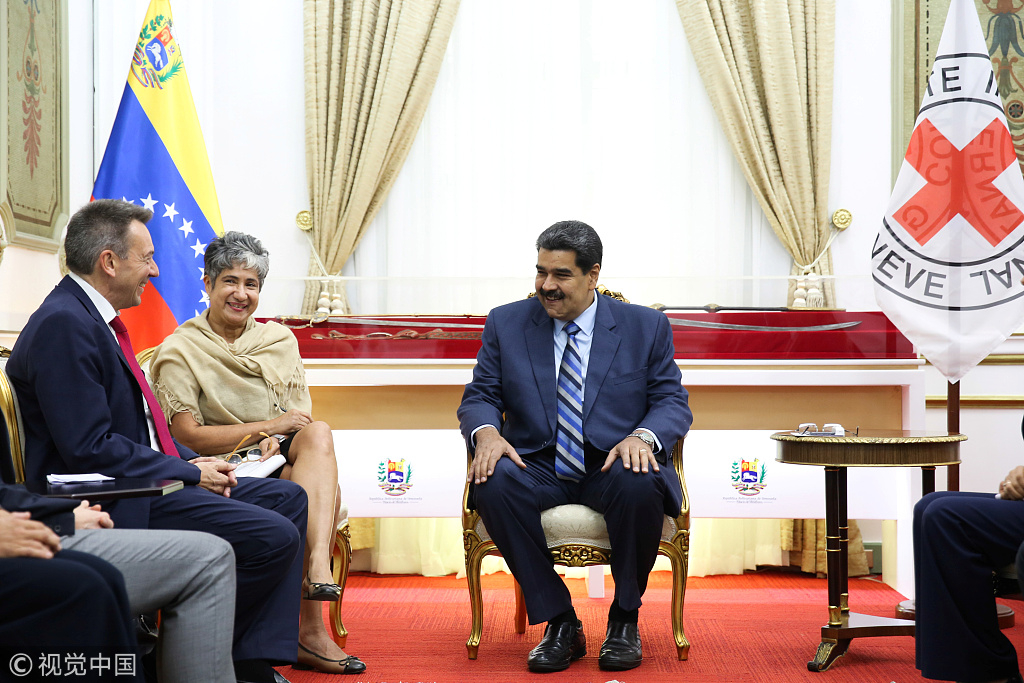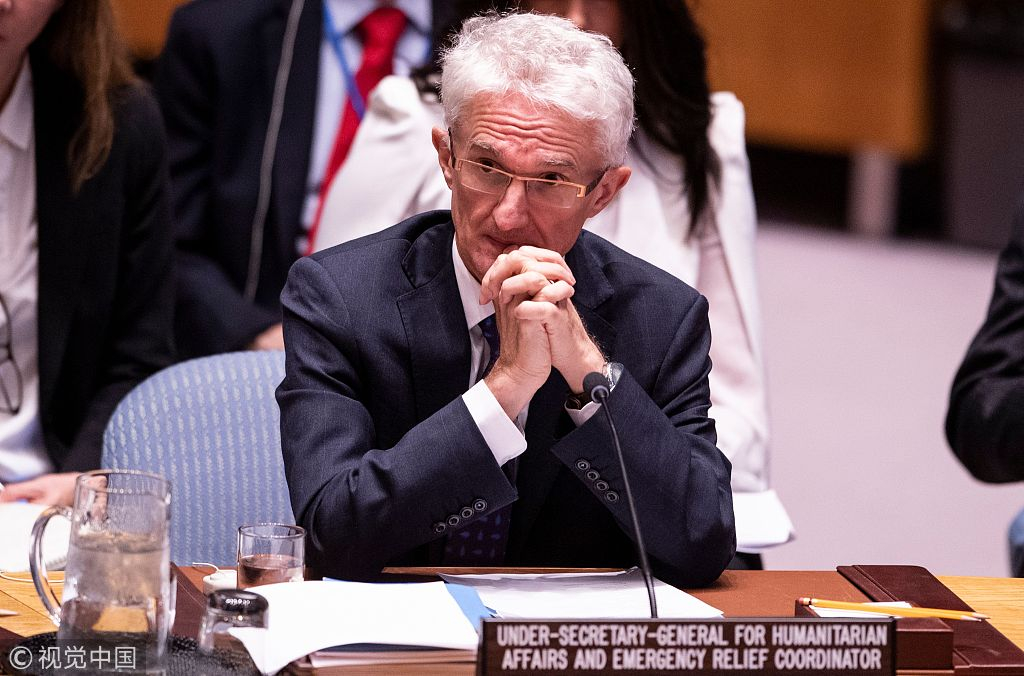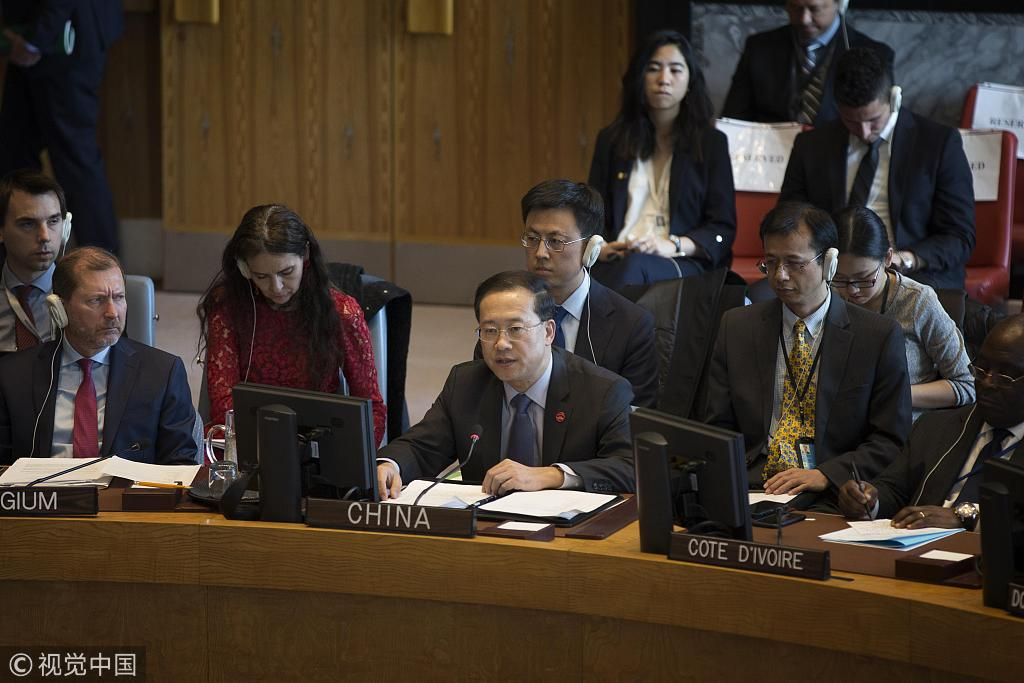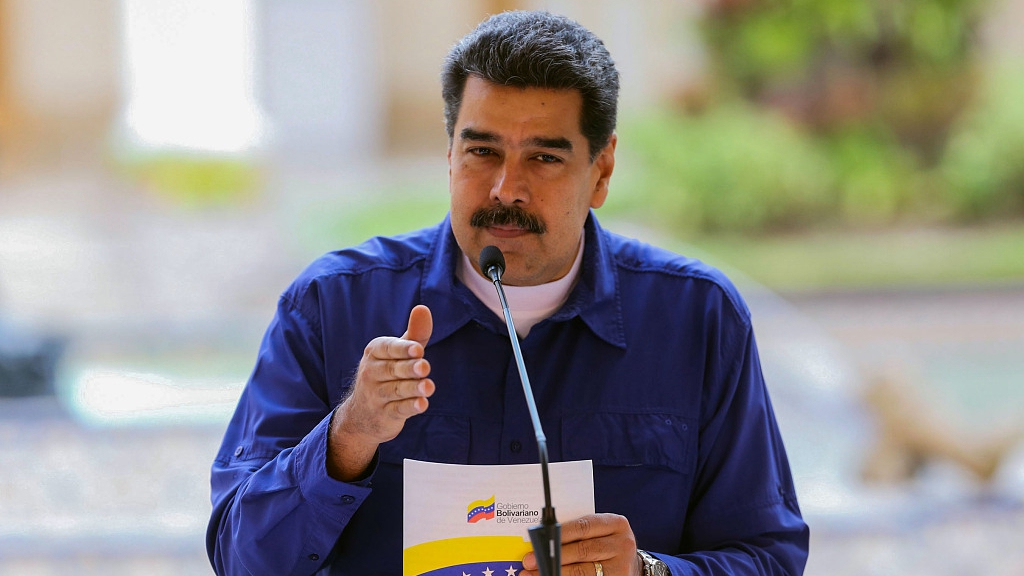Venezuelan President Nicolas Maduro said on Wednesday night that he had reached an agreement with the International Committee of the Red Cross for the delivery of humanitarian aid supplies, within the framework of respect for the national sovereignty of his country.
The United Nations estimates that seven million people in Venezuela, or about a quarter of the overall population, need humanitarian assistance and 1.9 million people require nutritional assistance, including 1.3 million children under the age of 5.
Maduro said on national TV and radio that his government and the Red Cross had agreed "to work together with UN agencies to bring into Venezuela all the humanitarian aid that can be brought."

Venezuela's President Nicolas Maduro (C) and Peter Maurer, president of the International Committee of the Red Cross (ICRC), talk during their meeting at Miraflores Palace in Caracas, Venezuela, April 9, 2019. /VCG Photo
Venezuela's President Nicolas Maduro (C) and Peter Maurer, president of the International Committee of the Red Cross (ICRC), talk during their meeting at Miraflores Palace in Caracas, Venezuela, April 9, 2019. /VCG Photo
UN humanitarian chief calls for more support to Venezuela
Earlier on Wednesday, UN Undersecretary-General for Humanitarian Affairs Mark Lowcock asked for more money to support the expansion of humanitarian programs in Venezuela.
"The resources available now are extremely modest in relation to the needs we see. I would like to thank member states which have contributed to the provision of humanitarian assistance in Venezuela... Your continued support is critical. But we need a lot more," Lowcock told the Security Council.
He also asked for an enabling operating environment for humanitarian assistance, including sustained and regular access to people in need.
The humanitarian situation in Venezuela has worsened since UN Undersecretary-General Rosemary DiCarlo last briefed the Security Council on Feb. 26, said Lowcock.
He noted recurrent widespread power outages have affected the whole country. Without electricity from the grid, many hospitals have struggled to carry out essential surgical procedures and to sustain intensive-care services and dialysis treatment.

Mark Lowcock, Under-Secretary-General for Humanitarian Affairs attends a UN Security Council meeting about the situation in Venezuela, in New York, April 10, 2019. /VCG Photo
Mark Lowcock, Under-Secretary-General for Humanitarian Affairs attends a UN Security Council meeting about the situation in Venezuela, in New York, April 10, 2019. /VCG Photo
The World Health Organization registered more than 400,000 cases of malaria in 2017, nearly 70 percent more than the year before. That was the largest increase in the world that year, said Lowcock.
The world body and other humanitarian organizations are on the ground, and have been expanding their operations, he said. Since 2017, the number of UN staff has increased from 210 to nearly 400. UN agencies are working in all 24 states of Venezuela.
Lowcock asked for more support as the scale of need is significant and growing. "The United Nations is willing and able to respond, consistent with the long-standing mandate member states have agreed for principled humanitarian action. We can do more to relieve the suffering of the people of Venezuela, if we get more help and support from all stakeholders."
China calls for political solution, lifting sanctions
A Chinese envoy on Wednesday called for a political solution to the Venezuela crisis and asked for the lifting of unilateral sanctions against the country.
"China calls on the Venezuelan government and opposition to seek a political solution through dialogue and consultations within the constitutional and legal framework," Ma Zhaoxu, China's permanent representative to the United Nations, told the Security Council.
He also called on relevant countries to lift unilateral sanctions against Venezuela.
History has proven repeatedly that unilateral sanctions will only further complicate situations and affect people's everyday life. It will not help resolve problems, nor will it bring peace to a country, he said.

Ma Zhaoxu, China's permanent representative to the United Nations speaks during a UN Security Council meeting in New York, U.S. on April 10, 2019. /VCG Photo
Ma Zhaoxu, China's permanent representative to the United Nations speaks during a UN Security Council meeting in New York, U.S. on April 10, 2019. /VCG Photo
"On the one hand, we hear a lot of talk about care for the well-being of Venezuelans. On the other hand, we are seeing increasingly tighter sanctions on the country. They are contradictory and the motive is dubious," said Ma.
"(We) hope that relevant countries will promptly lift unilateral sanctions against Venezuela, create normal conditions for its economic and social development, and lend help and support to the country in accordance with the basic principles of UN humanitarian assistance."
To help Venezuelan people overcome temporary difficulties, China has decided to provide emergency supplies for livelihood to Venezuela, said Ma.
Relevant supplies are on their way to Venezuela in batches. On March 29, the first batch of medicines and medical supplies were delivered to the Venezuelan government, he said.
China's assistance to Venezuela is in keeping with its long-held principles for foreign aid. It is intended to help Venezuelan people overcome negative impacts caused by external interference and sanctions with no political conditions attached, said the Chinese ambassador.
(With input from Xinhua and AFP)





